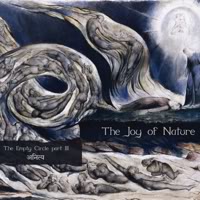 The Joy of Nature
The Joy of Nature
Anitya
Rage in Eden, 2010
Anitya is the final installment of The Joy of Nature’s three part alchemical trilogy, The Empty Circle. I will state immediately that it represents a more than fitting crown to the series. Its eerie fusion of folk, ambient, and world music influences creates endless dream states and liminal visions, subtle and absorbing allusions to the lapis, the elusive goal of the alchemical process.
As with the preceding albums in the series, Anitya is primarily instrumental in nature. It draws on an incredible array of instrumentation: a huge range of things with strings, wind instruments, percussion, drones, chimes, electronics, and carefully deployed samples, along with haunting choirs and compelling spoken word.
Flowing through the release is a somewhat Eastern musical feel, in line with the album’s Sanskrit moniker (which means “impermanence”); the carefully filtered tones of sitar make a memorable motif throughout the eleven compositions.
The path to the third and final stage of alchemy, the rubedo or reddening, culminates in the Mysterium Coniunctionis (to quote the title of Jung’s alchemical magnum opus), the union of opposites. Anitya invites this sacred conjunction through its artful musical fusions – Western and Eastern folk music, modern ambient composition, experimental atmospherics. The album draws together these disparate elements into a perfect whole.
As always, the order of the day with The Joy of Nature is the evocation of dreams, imaginal horizons, mystery. The music fluidly carries one’s consciousness into ever-deepening wells, and if this band (or artist, since Luis Couto is the genius spider in the centre of The Joy of Nature’s web) generally eschews conventional composition methods, the result is well worth it. Drifting and uncanny though it is, the music never lacks discipline and never slips into self-indulgence.
There are moments of deep, embodied joy that surface periodically throughout this album, and these are the flickering moments when the philosopher’s stone, the golden flower, the esoteric Christos, the hermaphroditic Mercurius, surface. For thousands of years, across almost every culture in the world, the object of alchemy has been difficult to describe, to articulate. It must be clothed in allusion and distant reference rather than literal expression. Anitya continues this tradition with a vivid authenticity that creates a very special musical journey.
The fleeting, floating moments where the stone surfaces in the music allude to a deeper “chymical marriage” that unfolds throughout the structure of the album. Anitya means impermanence, and through the evocation of the impermanent the album summons the alchemical gold and sacred lapis, which is eternal and unchanging.
The resultant paradox is best captured in the title of a song by The Third and the Mortal: “Persistent and Fleeting.” Surely this is the nature of all life, of our journey through this “floating world,” this all-too-real dream! With this album Couto has, like a true alchemist, uncovered the eternal and shining in the depths of the transient and obscure.
Despite the essentially Heathen focus of my personal spirituality, for some years alchemical symbolism has intruded forcefully into my life, which makes sense if we accept Jung’s conviction that such symbolism is rooted deeply in the universal patterns of the collective unconscious (and indeed can even be found studded throughout Germanic mythology).
Around the time my alchemical journey began to unfold (and it continues to this day), I stumbled over the first of the albums in the series of The Endless Circle. Since that time, The Joy of Nature’s profound sonic creations have guided and inspired me, and now that the circle is complete I wonder what changes that will invoke in my own life.
The three albums in the series have held a profoundly magical place in my life and I believe this speaks eloquently to their penetrating mystery and inspiring power. To share one’s ears and spirit with The Joy of Nature is not a small thing; it is a profound privilege.
As such I invite my reader to embrace the whole trilogy, to drink from this bottomless well of musical pleasure and wisdom. With great reverence I offer my praise to The Joy of Nature, and my gratitude for all three albums in the series of The Endless Circle: Swirling Lands of Disquiet and Catharsis, Rastos De Sangue E Fragmentos Da Tradição, and the crowning glory that is Anitya.









Leave a Reply